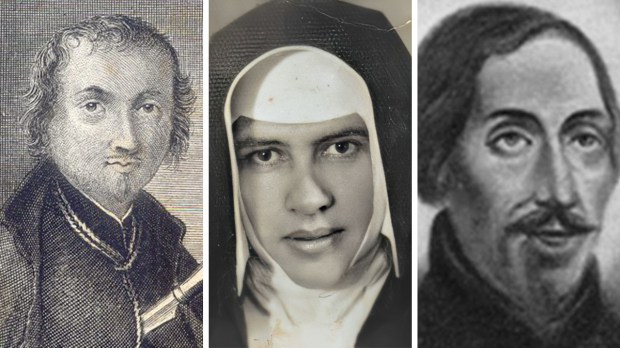As the world turns its attention to Tokyo, many of us may find ourselves murmuring prayers for athletes we’ve watched for years or just discovered this week. Whether we’re asking traveling mercies for the athletes, praying for a marathoner who’s flagging in the final stretch, or praying during our own athletic endeavors, there is (as always) a saint for that.
For protection during travel: Blessed Peter Kasui Kibe (1587-1639)
Kibe was a Japanese Christian who was denied admission to the Society of Jesus multiple times because of his race. He ultimately went to Rome in order to become a Jesuit priest (a journey that included 3,700 miles on foot) then spent eight years traveling in order to return to Japan. He was rerouted by storms, chased by pirates, and refused passage on ships bound for Japan before he finally built his own ship to sail the last leg of his journey. Even shipwreck couldn’t stop this priest who longed to be with his people. He finally made it to Japan, where he served the Hidden Christians of Japan for nine years before being betrayed and martyred.
For endurance in long competitions: St. Luke Baanabakintu (d. 1886)
Baanabakintu was a Ugandan sub-chief who walked nearly 100 miles every weekend (through jungles and forests and wading through a river twice each way, often fighting off wild animals or bandits) to get to and from Mass, where he memorized the homily and returned to repeat it to the Christians at home. When the news broke that Kabaka Mwanga had begun killing Christians, Baanabakintu could easily have run away. But rather than lie low, he set out at once for the home of his chief, to whom he and his dear friend St. Matthias Mulumba Kalemba submitted as Christians; both were martyred.
For the grace to keep our heads in the game: St. Philip Evans (1645-1679)
Evans was a Welsh Jesuit ordained in Belgium and sent back to Wales to serve as an undercover priest. After he was arrested for the crime of being a priest, he spent his time in jail playing the harp and playing tennis. When a jailer was sent to inform him that his execution had been set for the next day, interrupting his tennis match to take him back to prison, Fr. Evans responded, “What haste is there? Let me first play out my game.” Following his game, Fr. Evans spent what time remained to him joyfully playing his harp before being martyred.
For the fans: St. Dulce Pontes (1914-1992)
Dulce was a Brazilian nun who was nominated for a Nobel Prize for her work with the poor. A fan of the Ypiranga soccer team (one of the first integrated soccer teams in Brazil), young Dulce went to the stadium to cheer them on every Sunday with her father—except when she was grounded from soccer. Decades later, she still gushed about her favorite player, Popó. But she didn’t limit her love of soccer to watching; Dulce played as well, both in childhood and later after entering religious life, playing with children in the street to bring joy into their difficult lives. Dulce also built hospitals and soup kitchens and played her accordion to cheer up workers.
For safety while competing: Servant of God Guido Schäffer (1974-2009)
Guido was a Brazilian doctor and seminarian. He spent his time visiting the poor and offering them medical care, organizing prayer groups for his friends, and surfing near his home in Copacabana. According to a friend, Guido said that “surfing a tube, riding a tube was the perfect experience because it was like being embraced by God.” He was nearly done with seminary when he and a few friends went surfing as a sort of bachelor party for a friend who was getting married the next day. They prayed together before they went out, but Guido fell from his board, which hit him in the neck and knocked him unconscious; he drowned before his friends could pull his body to shore.
For good sportsmanship: Venerable Teresita Quevedo (1930-1950)
Teresita was a pretty and popular Spanish teen, the captain of her high school basketball team and a tennis star. Though tremendously talented on the tennis court, she never managed to win a championship. In her senior year she was favored to win; worried that a victory would inflate her pride, Teresita asked the Blessed Mother not for a victory but for whatever would be most pleasing to Jesus. When she lost, Teresita was able to accept the outcome with such joy that her mother, on seeing Teresita’s face, assumed her daughter must have won.
For protection from COVID-19: St. Henry Morse (1595-1645)
Morse was born an English Protestant but became a Jesuit priest and returned to England to serve covertly. Much of his work consisted in serving victims of the plague, both in the 1624 outbreak and again (after he had been banished from England but secretly returned) in 1635. In 1635-1636, Fr. Morse contracted the plague three times but recovered each time. When he was later captured, his work with plague victims was considered and he was released. The next time he was captured, there was no such clemency, and Morse was martyred.


